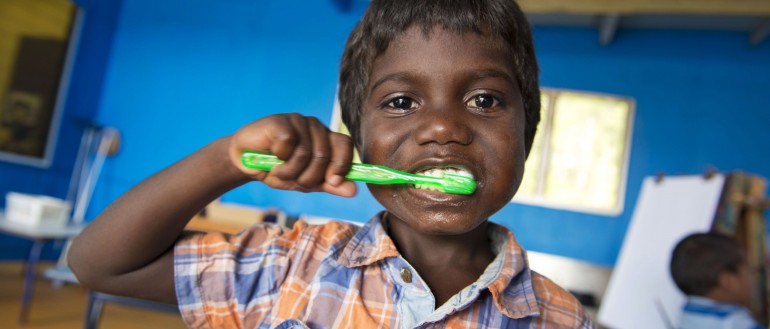Aims:
- To trial an evaluation approach that utilised a tool that incorporated the constructs and principles of the Theory of Planned Behaviour (TPB) and ecological theory for use primarily in the remote Australian Aboriginal community setting.
Objectives:
-
To identify the physical barriers that may prevent community members from easily adopting the recommended behaviours
-
To assess coverage by measuring how many people have access to functioning televisions
-
To measure how many people had seen the new commercials
-
To identify any change in beliefs, attitudes and behavioural intentions that might be attributed to having seen the commercials.
Summary:
The evaluation was planned and implemented collaboratively between a health research institute and Territory and State Government agencies. A survey questionnaire was developed taking account of key social, economic, cultural and environmental factors previously identified as barriers to, or promoting of, handwashing with soap in remote communities and based on the principals and constructs of the TPB. Survey occurred immediately before and on completion of intensive screening of the commercials. Six remote Aboriginal communities representing three different geographical regions participated in the evaluation. The scope of project activities was restricted due to having only 12 months to develop and deliver the intervention and complete the evaluation.
Implications for policy and practice:
Generally all participants in both survey rounds provided a high score, if not a maximum score, to individual questionnaire items concerning their beliefs that handwashing with soap and facial cleanliness can interrupt child to infant spread of infection. Thus, indicating a generally good level of knowledge on this topic and that future hygiene improvement promotion that target adults in remote communities should focus less on providing education programs and more on working in the challenging areas of changing environmental factors and fostering new social norms.
Our research has found:
The geographical reach and population coverage achieved, and the number of participants who reported seeing and liking the commercials, was satisfactory given the short length of time the commercials were televised. Pre and post-intervention analysis showed no changes in participants’ beliefs, attitudes and behavioural intention that might be confidently attributed to them having seen the commercials. However, taking an ecological approach and examining participants’ beliefs, attitudes, sense of self efficacy, social norms and other elements of the TPB provided for obtaining rich information which is useful beyond reporting on the outcome of this evaluation. The findings of this evaluation will support evidence - based approaches are taken to plan and evaluate future NGoM program activities.
Chief investigator:
Contact information:
Project dates:
The project was completed in 2014.
Funders:
- The Australian Government’s Department of Health Environmental Health Standing Committee (enHealth) – Working Group on Aboriginal and Torres Strait Islander Environmental Health contributed funding towards this research.
- In-kind and financial support was also provided by the Northern Territory Government and Western Australian Government Environmental Health Branches.
Collaborators:
- Northern Territory Government and Western Australian Government Environmental Health Branches.
- 'No Germs on Me' | School kids
- 'No Germs on Me' | Young boy and baby
- 'No Germs on Me' | Young family
- 'No Germs on Me' handwashing campaign material
- Global hand washing day song
- Hand washing four fingers game
- Hand washing number game 1
- Hand washing number game 2
- Hand washing word game 1
- Hand washing word game 2
- Hand washing word game 3
- McDonald, E., Cunningham, T., & Slavin, N. (2015). Evaluating a handwashing with soap program in Australian remote Aboriginal communities: a pre and post intervention study design. BMC Public Health, 15,1188.
- McDonald, E., Slavin, N., Bailie, R., & Schobben, X. (2011). No germs on me: a social marketing campaign to promote hand-washing with soap in remote Australian Aboriginal communities. Global Health Promotion, 18, 62-65.

